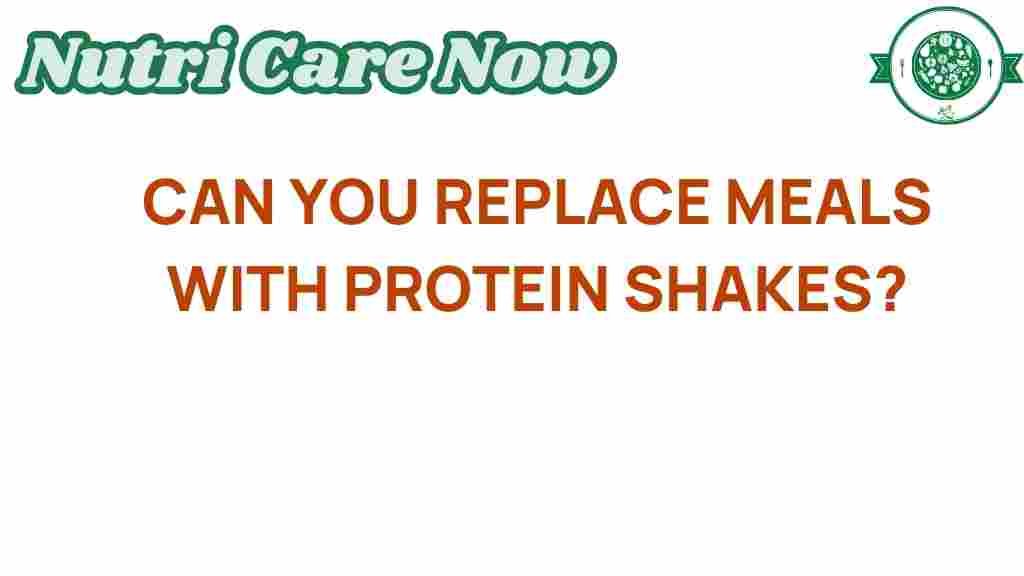Can Protein Shakes Truly Replace Your Meals?
In today’s fast-paced world, convenience often takes precedence over nutrition. As a result, many people are turning to protein shakes as a quick solution to their dietary needs. But can protein shakes truly replace your meals? This article unpacks the myths surrounding protein shakes and meal replacement, focusing on their nutrition, health benefits, and role in diet trends.
Understanding Protein Shakes
Protein shakes are beverages typically made from protein powder mixed with water, milk, or other liquids. They are popular among athletes, fitness enthusiasts, and those looking to manage their weight. As meal replacements, they promise to deliver essential nutrients in a convenient form. However, the question remains: are they a suitable alternative for full meals?
The Rise of Meal Replacement Products
In recent years, meal replacement products, including protein shakes, have gained traction among various diet trends. Their appeal lies in their convenience, especially for those with busy lifestyles. Here are some reasons why meal replacements are popular:
- Time-saving: Preparing a full meal can be time-consuming. Protein shakes can be prepared in minutes.
- Portability: They can be taken on the go, making them suitable for busy professionals and athletes.
- Caloric control: They help individuals manage their caloric intake, which is beneficial for weight loss.
The Nutrition Factor
One of the main concerns regarding protein shakes as meal replacements is their nutritional content. While protein is essential for muscle repair and growth, a well-balanced meal should contain carbohydrates, fats, vitamins, and minerals. Here’s how protein shakes stack up nutritionally:
- Protein: Most protein shakes provide a concentrated source of protein, which is crucial for muscle maintenance.
- Carbohydrates: Many protein shakes are low in carbohydrates, meaning they might not provide enough energy for active individuals.
- Fats: Some shakes contain little to no healthy fats, which are vital for hormone production and overall health.
- Vitamins and Minerals: Many shakes are fortified with vitamins and minerals, but they may not offer the full spectrum found in whole foods.
Health Benefits of Protein Shakes
Despite the concerns, protein shakes do offer several health benefits when used appropriately:
- Weight Management: Protein shakes can aid weight loss by promoting satiety and reducing overall caloric intake.
- Muscule Recovery: They are ideal for recovery post-workout, providing the necessary nutrients to repair muscles.
- Convenience: They are an easy way to increase protein intake, especially for those struggling to meet their dietary needs.
Are Protein Shakes Suitable Meal Replacements?
The suitability of protein shakes as meal replacements largely depends on individual dietary needs and lifestyle. Here are some factors to consider:
- Caloric Needs: If you have higher caloric needs due to intense workouts, relying solely on protein shakes may leave you undernourished.
- Dietary Balance: A balanced diet should include a variety of food groups. Using protein shakes as a sole source of nutrition can lead to deficiencies.
- Personal Goals: For those focused on weight loss, protein shakes can be effective when combined with whole foods.
Integrating Protein Shakes into Your Diet
If you decide to incorporate protein shakes into your diet, here’s how to do it effectively:
- Assess Your Needs: Determine your daily protein requirements based on your activity level and goals.
- Choose Quality Products: Look for high-quality protein powders that contain minimal additives and sugars.
- Combine with Whole Foods: Instead of replacing all meals, use protein shakes as a supplement. Pair them with fruits, vegetables, or whole grains.
- Monitor Your Progress: Keep track of your nutrition and how you feel. Adjust your intake as necessary.
Troubleshooting Common Issues
While transitioning to a diet that includes protein shakes, you may encounter some challenges. Here are some common issues and their solutions:
- Stomach Discomfort: If you experience bloating or gas, try a different protein source (e.g., plant-based vs. whey) or reduce the serving size.
- Flavor Fatigue: To avoid getting bored, experiment with different flavors, add fruits, or mix in nut butters.
- Feeling Hungry: If you find yourself still hungry after a shake, consider adding more fiber or healthy fats to increase satiety.
Conclusion: Finding Your Balance
In conclusion, while protein shakes can be a convenient addition to your diet, they should not entirely replace whole meals. A balanced diet incorporating a variety of food groups is essential for optimal health. Rather than viewing protein shakes as a complete meal replacement, consider them a tool to enhance your nutrition, particularly in conjunction with your fitness goals.
Ultimately, the key to a successful diet is understanding your personal needs and maintaining a healthy balance. For more information on nutrition and meal planning, check out this comprehensive guide on dietary balance. Remember, the most effective diet is one that you can maintain in the long run, combining convenience with comprehensive nutrition.
For further reading on the latest diet trends and health benefits of protein shakes, visit this resource.
This article is in the category Diet and created by NutriCareNow Team
